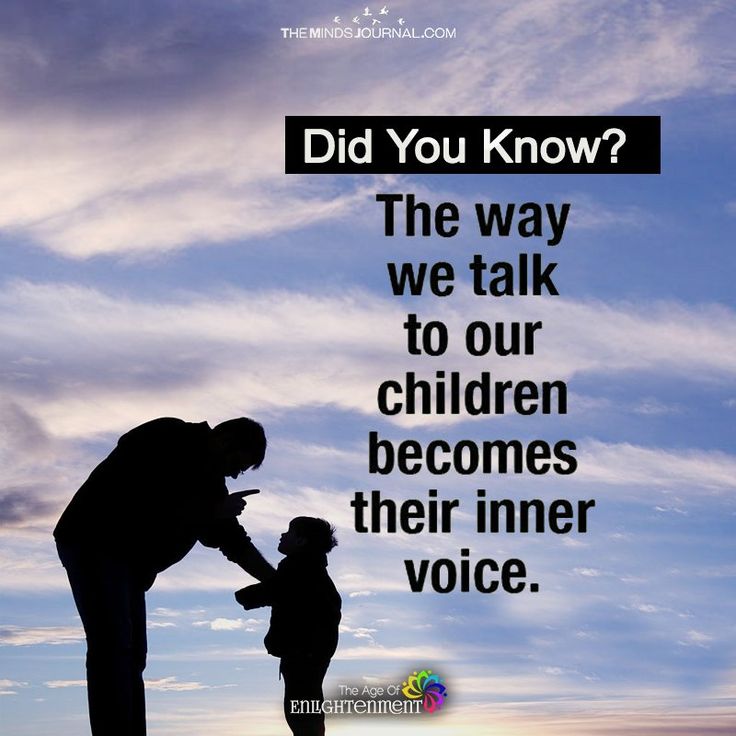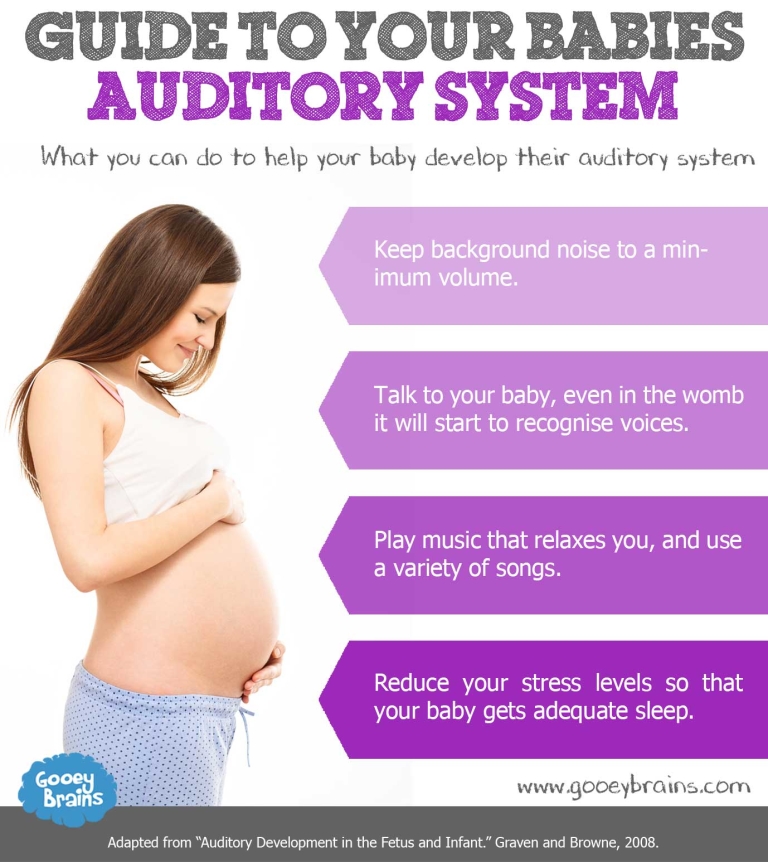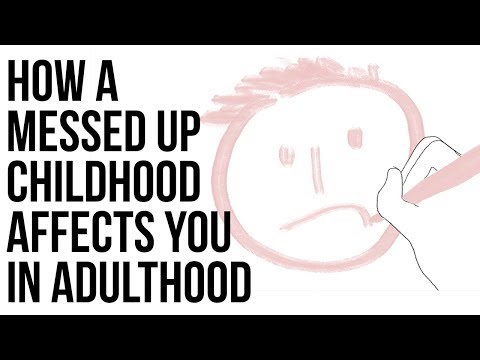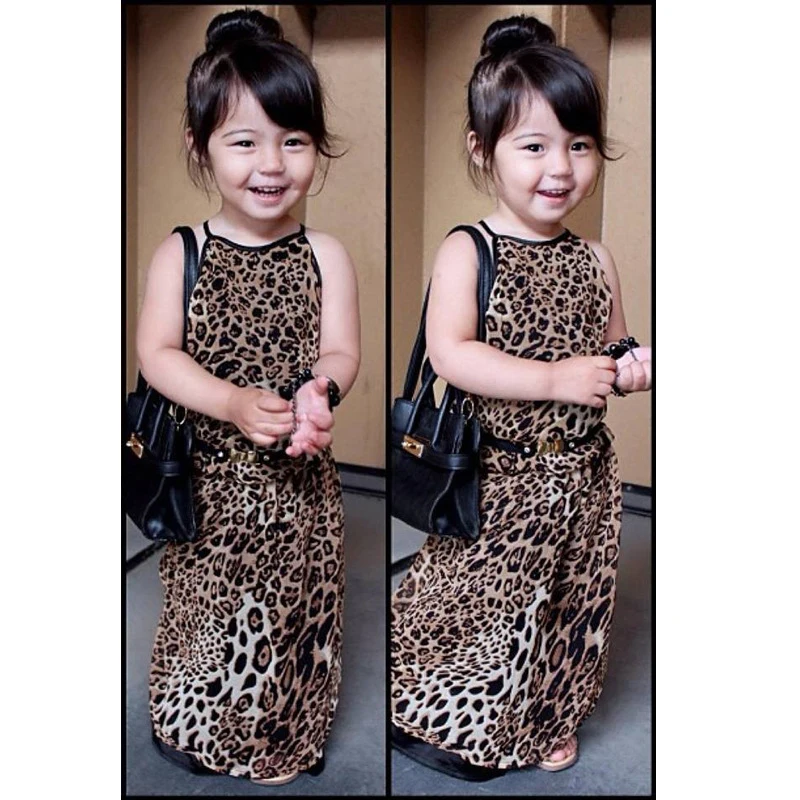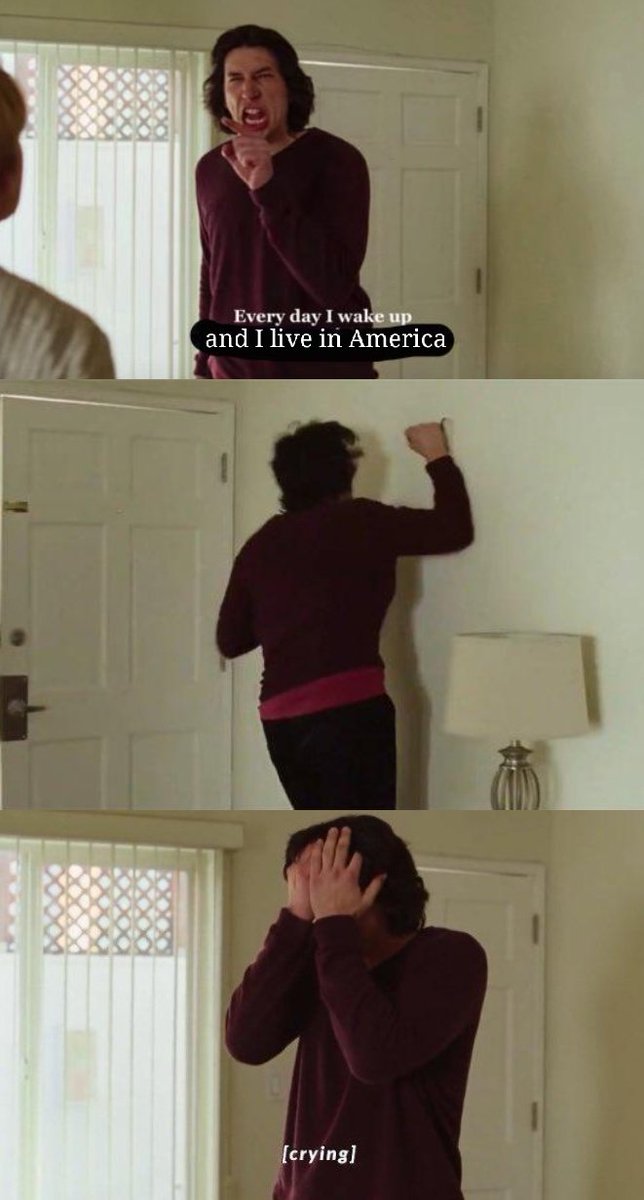How you speak to your child becomes their inner voice
The Way We Speak to our Children Becomes Their Inner Voice
Ever notice that small voice inside your head? The one that might give you a pep talk in challenging situations – You got this! Or the one that might cause you to further doubt yourself when feeling insecure – What is wrong with you?
While having positive or negative self-talk is just part of being human, often times the self-talk that children develop comes from the patterns in which their parents and other loved ones speak to them. So it’s critical that we remain mindful of how we are interacting with our kids in terms of the words we use, the tone we express, and the messages that we convey to ensure that they consistently feel loved, respected, and well supported by parents no matter the situation. With that said, no one is perfect! We all make mistakes. We all lose our cool. The key is how we recover from such situations and how we address them with our kids.
So let’s talk about negative talk. The human brain processes positive and negative information differently. Without getting into the science of it, negative information and unpleasant emotions tend to have more of an impact than positive ones. Think about it. We have a tendency to notice undesirable behavior and bad events in the world more than the positive. We similarly tend to call more attention to our children’s misbehavior and fail to notice when they are engaging in expected or appropriate behavior. As a result, children may hear more criticism from parents rather than praise, which can affect their self-esteem and that inner voice. Below are some tips in how we can we switch this paradigm.
· Catch your child being good. Often times, parents feel the need to walk on eggshells when the kids are finally getting along or behaving, but then jump in and intervene once misbehavior emerges. Instead, provide positive feedback when you notice appropriate behavior. It doesn’t have to be a grand gesture, but a simple acknowledgement of the positive: I appreciate seeing the two of you work together; Great keeping calm even though you didn’t get your way; Thank you for asking so nicely.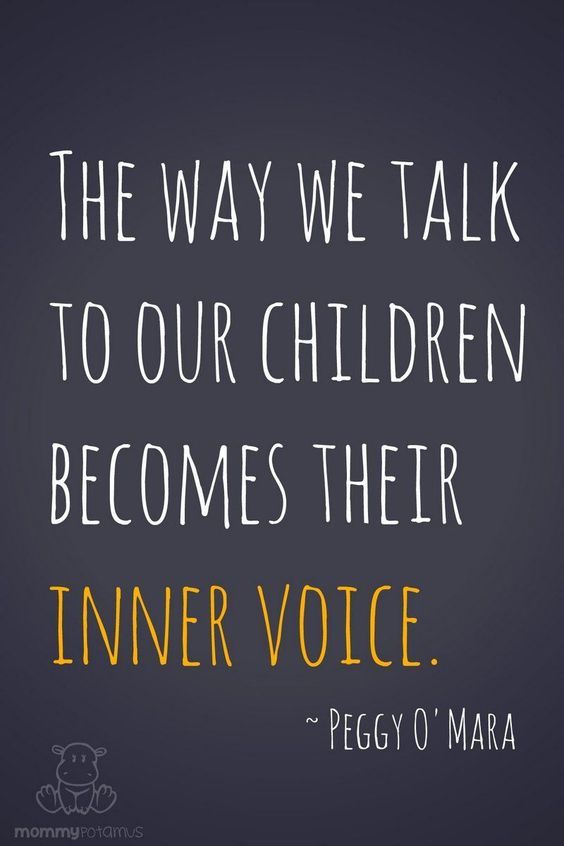
· Be specific with your praise. Unlabeled praise (Nice work, Excellent, I like that) is fine, but it may not be clear to your child what it is that you are noticing. Instead, tell your child exactly what they’re doing that you like: Nice work putting your toys away; Excellent helping your brother; I like that you started your homework right after your snack. Similarly, if something is challenging for your child, try to notice their efforts rather than whether they did something correctly. So if they are learning something new in math, but got the wrong answer: I love seeing how hard you worked on your homework. I got a different answer for this one. Try again.
· Praise your child 5 times for every 1 criticism. While avoiding negative talk and criticism of your child altogether is a great goal, it’s unrealistic. Aiming for a 5:1 ratio of praise to criticism is more attainable and backed by research in creating happy, healthy environments.
· Be mindful of your nonverbal communication and practice self-care.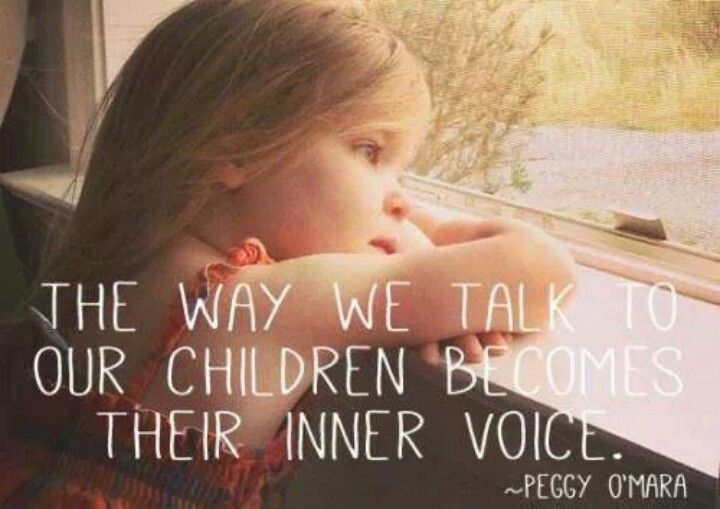 This includes your tone of voice, facial expressions, and body language. Why? Because even if you’re providing the most beautiful praise, certain nonverbals may suggest that you are being sarcastic or inauthentic. Or worse, combining criticism with a negative tone of voice, disapproving or angry facial expression, and/or tense body language just brings more negative energy to the interaction, having an even more negative impact on your child’s self-esteem and inner voice. So practice and model your own self-care to stay cool, calm, and collected in even the most trying circumstances. Some simple coping skills include:
This includes your tone of voice, facial expressions, and body language. Why? Because even if you’re providing the most beautiful praise, certain nonverbals may suggest that you are being sarcastic or inauthentic. Or worse, combining criticism with a negative tone of voice, disapproving or angry facial expression, and/or tense body language just brings more negative energy to the interaction, having an even more negative impact on your child’s self-esteem and inner voice. So practice and model your own self-care to stay cool, calm, and collected in even the most trying circumstances. Some simple coping skills include:
o taking three slow, deep breaths
o tensing and releasing tight muscles in your body (e.g., shoulders, hands, face) to relax
o momentarily stepping away from stressful situation for a glass of water and a moment alone
· Model how to acknowledge and apologize for your own misbehavior. Lose your cool? It happens to all of us. If we want children to learn to take responsibility for their own misbehavior, we need to demonstrate that ourselves.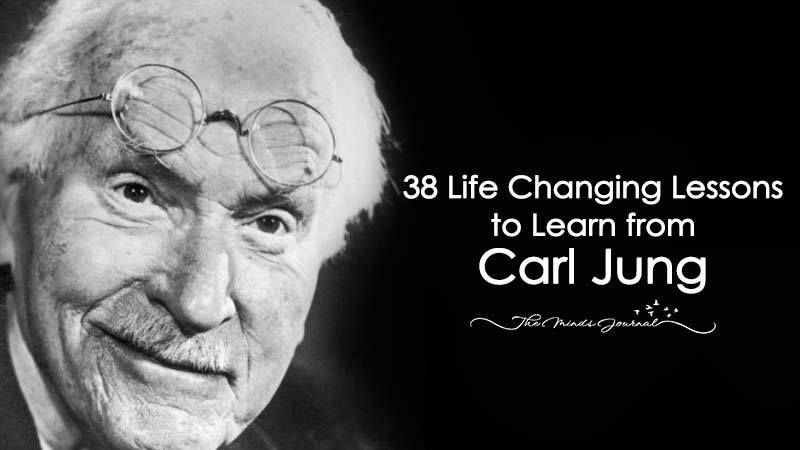 Remember, children learn about the world and how people interact by observing and imitating their parents’ behavior. So when you cross the line, wait until things cool down and have a calm conversation acknowledging this: I was really angry last night. And while it’s ok to be mad, it’s not ok to be disrespectful. I shouldn’t have said the things I said to you last night. I am sorry and I will try to use my words more carefully next time. I love you.
Remember, children learn about the world and how people interact by observing and imitating their parents’ behavior. So when you cross the line, wait until things cool down and have a calm conversation acknowledging this: I was really angry last night. And while it’s ok to be mad, it’s not ok to be disrespectful. I shouldn’t have said the things I said to you last night. I am sorry and I will try to use my words more carefully next time. I love you.
The way we talk to our children becomes their inner voice
Every morning, it starts over. We get a chance to shape the lives of our children. The way that we talk to our children becomes their inner voice.
Think about when your kids make a poor decision… they spill milk on their homework (when they aren’t supposed to be eating or drinking near it), they break your favorite picture frame (when they shouldn’t be throwing a ball in the house), they don’t clean up their room, they track mud into the house… each thing after you’ve told them time and time again what to do.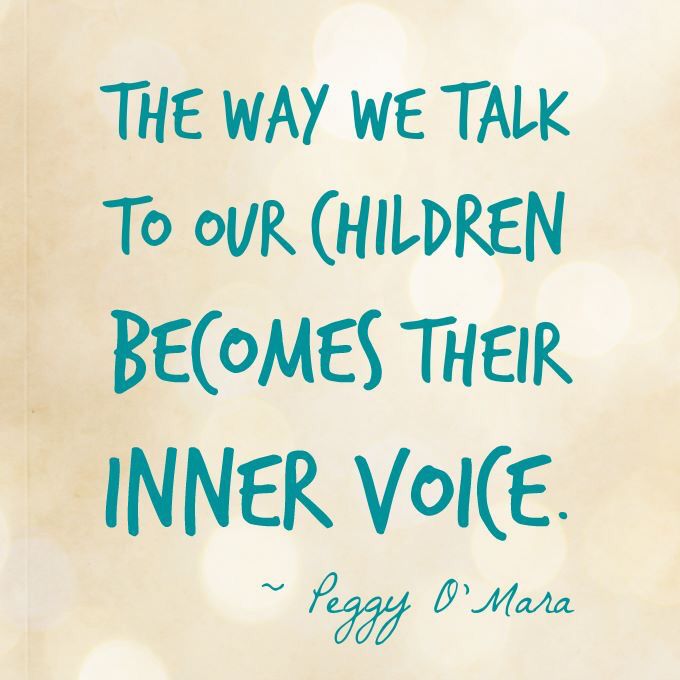 Your first reaction “Ugh! I wish that you would have listened to me… this would not have happened!”
Your first reaction “Ugh! I wish that you would have listened to me… this would not have happened!”
I get it, because I did this, too.
Last year, Mickey and I started trying something different. We looked at the ACTION, not our kids. Instead of reacting with anger, we reacted with empathy. I stopped yelling, stop reprimanding, but instead, just gave the consequence with sincere empathy.
Yes, our words resonate with our children.
(Thanks to my husband for this picture & to Peggy O’Mara for the quote)
Remind your kids that you love them, no matter what they’ve done.
THESE FOUR WORDS WILL CHANGE THE WAY THAT YOU PARENT: “I LOVE YOU AND…”
You are telling them that you love them even though they have done something that you aren’t happy about. That doesn’t change how much you love them.
When our kids do something that I disapprove of, I often start with “I love you so much.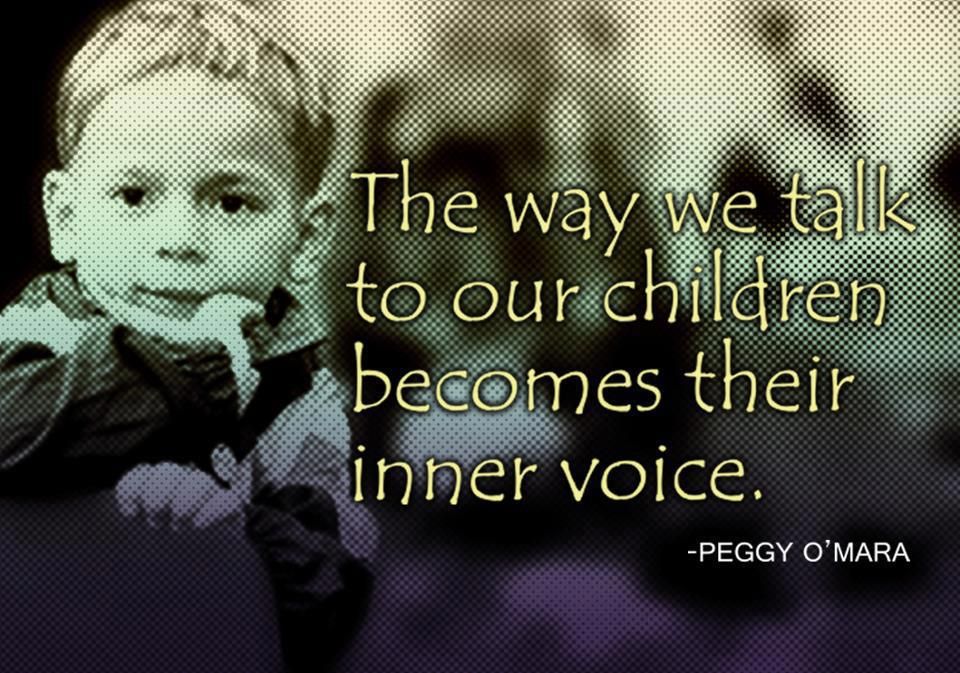 Your choice today made me really sad, and it wasn’t what I expected from you” or I will discipline them and talk to them afterward. I tell our kids, every day, “I love you all the time. I love you when I am happy or sad. I love you when I am excited or angry. I love you when you make good choices and bad choices. I love you when you are home or away” … (the list goes on & on).
Your choice today made me really sad, and it wasn’t what I expected from you” or I will discipline them and talk to them afterward. I tell our kids, every day, “I love you all the time. I love you when I am happy or sad. I love you when I am excited or angry. I love you when you make good choices and bad choices. I love you when you are home or away” … (the list goes on & on).
Our kids do it, too. Just yesterday, Ethan (our 5-year old) said, “Mom, I’m sorry that I wasn’t nice to you today at lunch. I was mad because I wanted peanut butter and jelly. I love you all the time, even when I’m mad at you.”
You can’t take it back.
I was a teacher and one time I had a conference with a student and his family. When I told his parents about his declining reading score, he looked right at his son and said “Do you even try?” and looked back at me and said, “Sometimes, he can be so dumb.”
I was dumbfounded.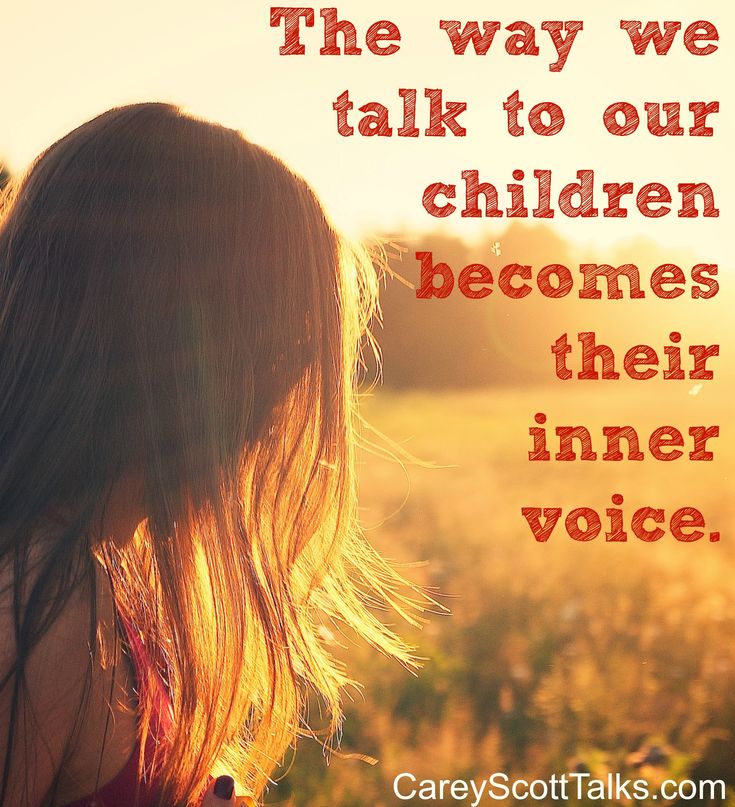
What on earth is going on here?! I used that opportunity to build up the child and explain his many, many strengths. The point is that you can’t take it back. You can’t take back words like “lazy” or “dumb” or “thoughtless” or “mean” – once they are out there, they stay out there. Your kids continue to hear these words in their heads.
Instead of “You are so lazy. Get up and help me!” Try “You work so hard. Can you give me a hand? It will get done so much faster.” I can (almost) guarantee that it will work 100% better than going the negative route. Instead of tearing them down, you are building them up and achieving the same end result: they are helping you.
Today, use your words to help your kids. If you are looking for more on the subject, check out the course Parenting Manual 101.
** If you liked this post, I want to encourage you to sign up for my FREE e-mail series about one-on-one time.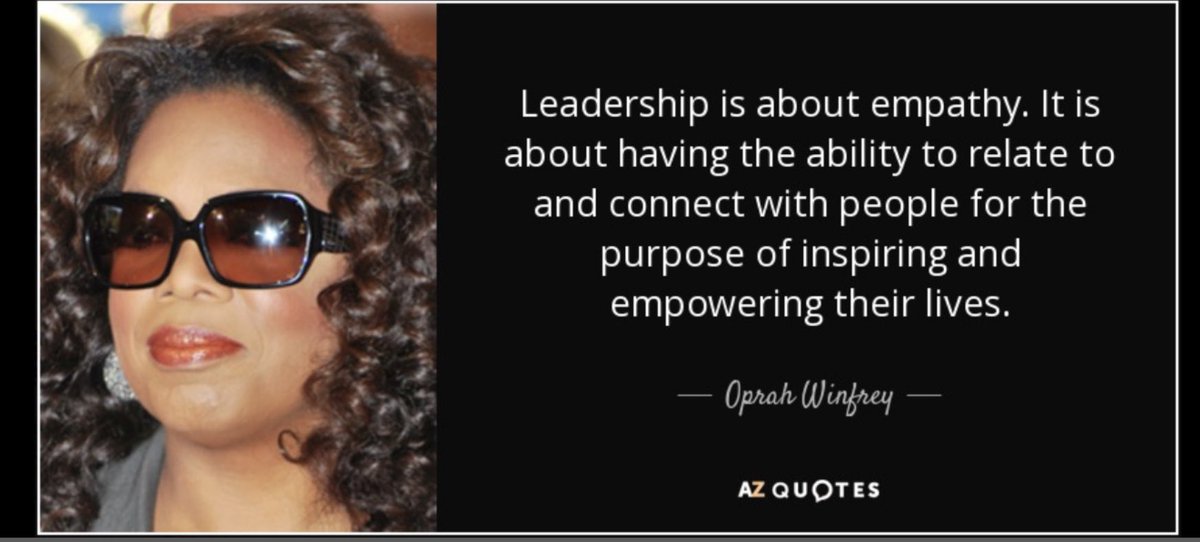 I will send you tips, ideas & encouragement in my free e-mail course. No strings attached… I just want to help you find that relationship with your child that you both deserve. ♥. You can sign up here.
I will send you tips, ideas & encouragement in my free e-mail course. No strings attached… I just want to help you find that relationship with your child that you both deserve. ♥. You can sign up here.
I’ll send you this calendar, too.
About Becky Mansfield
Hi! I'm Becky Mansfield ~ founder of Your Modern Family. I am the wife to Mickey & the mom to four little blessings! I am a teacher turned play therapist and stay at home Mom. I love to share my organization tips, kid ideas, money-saving tips and recipes with you. Read more...
© YourModernFamily.com. Content and photographs are copyright protected. Sharing of this article is encouraged and appreciated, copying and/or pasting articles to any social media is strictly prohibited.
Peggy O'Mara quote: Be careful how you talk to your kids. ...
- Peggy O'Mara
Last update June 29, 2022
Topic
Voice
O'Mara
1Similar quotes
“If you hear an internal voice, which is heard, which tells you: “You cannot paint”, paint by all means, and this voice will one day be silent. ”
”
— Vincent van Gogh Dutch post-impressionist painter 1853 - 1890
„Be yourself! Don't listen to anyone! Go where your inner voice tells you! Be with those with whom your soul is comfortable! And then everything will be GOOD!”
— Oleg Roy 1965
Source: https://vk.com/public.realyroy
“Be yourself! Don't listen to anyone! Go where your inner voice tells you! Be with those with whom your soul is comfortable! And then everything will be GOOD!“
— Oleg Roy 1965
Source: Oleg Roy "The Writer and the Ballerina"
“The only tyrant I recognize is the inner voice.”
— Mahatma Gandhi one of the leaders and ideologists of the Indian independence movement from Great Britain 1869 - 1948
“Conscience is the inner voice of the goodness inherent in the human soul.”
- Valentin Sventsitsky 1881 - 1931
"Conscience is an inner voice warning that someone is following us."
- Henry Louis Mencken American journalist, essayist, satirist 1880 - 1956
".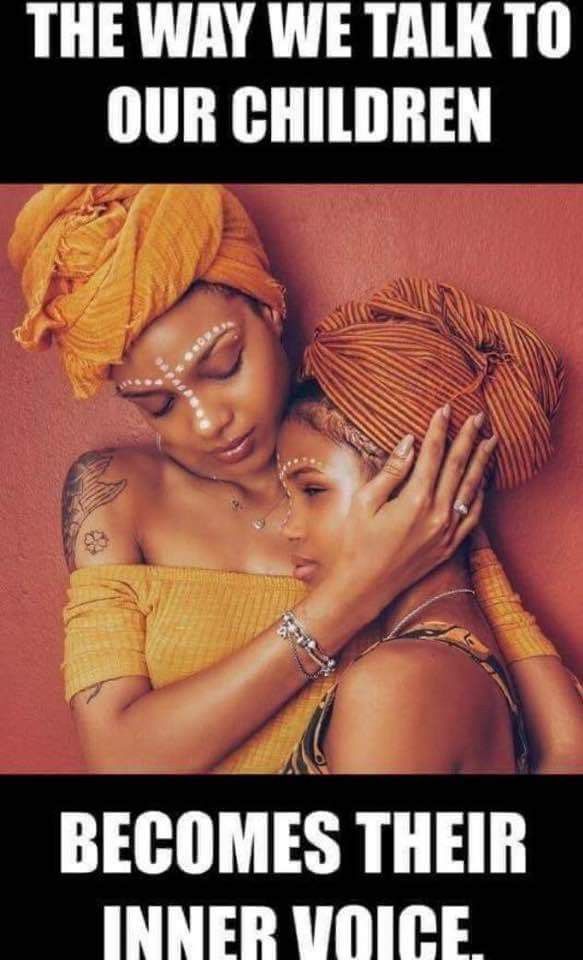 .. and the inner voice kept saying that happiness is there, outside..."
.. and the inner voice kept saying that happiness is there, outside..."
— Maya Chetvertova
activist 1817 - 1862
“The inner voice often turns out to be the most implacable opponent.”
— Eduard Alexandrovich Sevrus (Borokhov) 1948
“We love our inner voice to reach us from outside.”
— Stanisław Jerzy Lec Polish poet, philosopher, satirist and aphorist of the 20th century 1909 - 1966
“As Patricia Petibon, an opera singer, said, the voice is the center of the soul. I absolutely agree with her... A voice is a person's personality. The voice has changed over the years. The voice is your accumulated experience...
Once I asked a speech therapist: what kind of voice is beautiful for you? He replied that the most beautiful is a sincere voice that speaks the truth…”
— André Dussolier 1946
“Don't let the noise of other people's opinions drown out your inner voice.”
— Denis Cheryshev Russian football player 1990
“Everyone who wishes this can listen to his inner voice. It is inside each of us.“
It is inside each of us.“
— Mahatma Gandhi one of the leaders and ideologists of the movement for the independence of India from Great Britain 1869 - 1948
Controversial
all. Both Ukraine and Turkey, do you understand? This is just in time for the question of the loss of some kind of identity, one's own voice in international affairs. This is a question - how did the European Union set itself up if it allows non-member countries to demand something from themselves and talk like they are talking to it now. "
— Maria Vladimirovna Zakharova Russian diplomat, Director of the Information and Press Department of the Ministry of Foreign Affairs of the Russian Federation 1975
about the difficult situation in the European Union
“How can you trust your inner voice if in the morning, when you have to go to work, it says that you need to sleep? "
- Robert Downey Jr. 1965
"I'm confident in my faith, I believe in my rap.
I believe that one day my damn voice will be heard everywhere.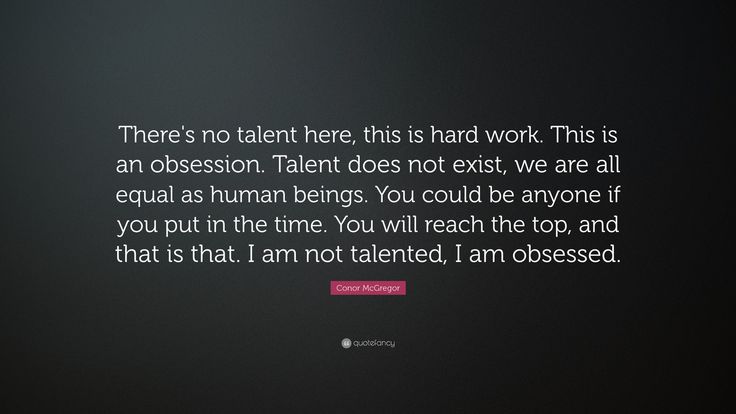 ”
”
— Kim Nam Joon (Rap Monster) 1994
Source: Song I Believe
„Marceline': …We women are ardent but shy; no matter what spells attract us to pleasure, the most windy woman always hears an inner voice that whispers to her: “Be beautiful if you can, modest if you want, but so that the rumor about you is good: this is certainly” ... ('Crazy day , or The Marriage of Figaro, Act Four').“
— Sofia Mikhailovna Rotaru Russian, Ukrainian, Moldavian and Soviet pop singer and actress 1947
Quotes from actors
„And we all die alone.
Without giving a true voice to either friends or enemies.
As if fenced off from each other by impenetrable walls of prison casemates.
In solitary confinement with his thoughts, with his feelings. "
- Vlas Mikhailovich Doroshevich Russian writer, feuilletonist, publicist, theater critic 1865 - 1922
"The voice of nomadic ancestors spoke in him: he began to ask for a business trip."
- Emil Krotky Russian and Soviet poet, satirist, feuilletonist 1892 - 1963
"Excerpts from the Unwritten"
Source: http://lib. ru/ANEKDOTY/KROTKIJ/nenapisannoe.txt
ru/ANEKDOTY/KROTKIJ/nenapisannoe.txt
we lose our voice; this is quite logical.“
— Jerzy Leszczynski Polish theater and film actor, director 1884 - 1959
Related topics
- Voice
10 phrases with which we want to support the child, but only make it worse
“I would like your problems”, “Don’t cry, you will have a hundred more Sashas like that”, “But a brother at your age ...” - we definitely heard these and other phrases from our parents, and some of them out of inertia We also speak to our children. Psychologist-consultant, specialist in the field of parent-child relations Svetlana Lukka explains what is wrong with these words and offers a non-toxic alternative.
1. “Just think, exams! I found something to be afraid of!
How the child feels. He sincerely feels anxiety and uncertainty. At this moment, he needs an adult to support him with faith in success, his understanding and sympathy. When a child's feelings are devalued - "what worries you is insignificant" - he feels alone, insecure, and anxiety only intensifies.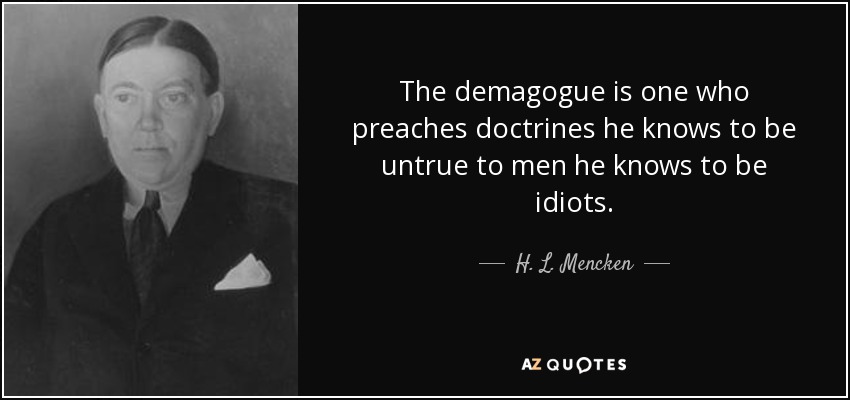
What does this lead to. In order not to regularly fall into a situation of devaluing his feelings, the child begins to hide emotions, thoughts, and then facts. It seems to us, adults, that by devaluing the cause of anxiety, we provide support, but in reality this is perceived as our deafness in relation to his experiences.
Alternative. "Worried? Yes, I know what you mean. But I believe that you can handle it."
2. “That Vanya is not worth you!”
How the child feels. The first lost love is a tragedy. Real. The child is in pain, life has lost its meaning. The first loss is the hardest. The Vanya that was lost is the best. When parents belittle him in every possible way, they thereby devalue the child's feelings towards this Vanya.
What does this lead to. On the one hand, the child moves away from his parents. He believes that at a difficult moment he is not understood and supported by the closest people.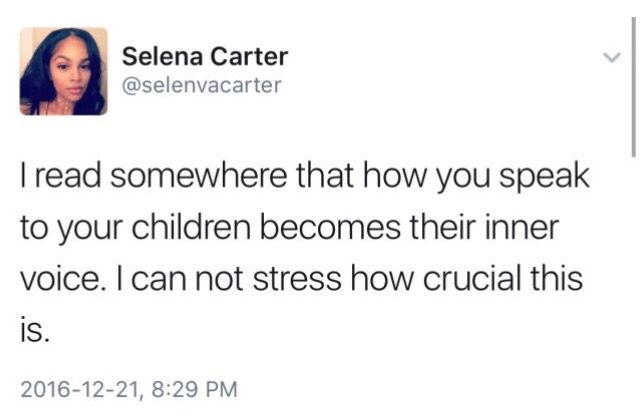 And what's the point of talking to them then? On the other hand, if parents all the time emphasize that the same Vanya (Anna) is stupid and does not understand what kind of treasure he got, the child may decide that Vanya (or Anya) as a fool needs to prove his love. It is from here that the legs of stalkerism, fixation on the former partner and the inability to let him go grow. Is it worth saying that all this humiliates a person and does not make him happy?
And what's the point of talking to them then? On the other hand, if parents all the time emphasize that the same Vanya (Anna) is stupid and does not understand what kind of treasure he got, the child may decide that Vanya (or Anya) as a fool needs to prove his love. It is from here that the legs of stalkerism, fixation on the former partner and the inability to let him go grow. Is it worth saying that all this humiliates a person and does not make him happy?
Alternative . "It's hard for you right now. I understand your pain. But I'm around. And I love you. And Vanya (Anya) is a separate person, he decided to do this not because you are bad (bad). You are good (good), and the best thing you can do now is to respect the decision of this person, his individuality and will. If he changes his mind, you'll be the first to know."
3. “Everyone did well except you. All because of your inattention!”
How the child feels. He is already feeling bad in the current situation.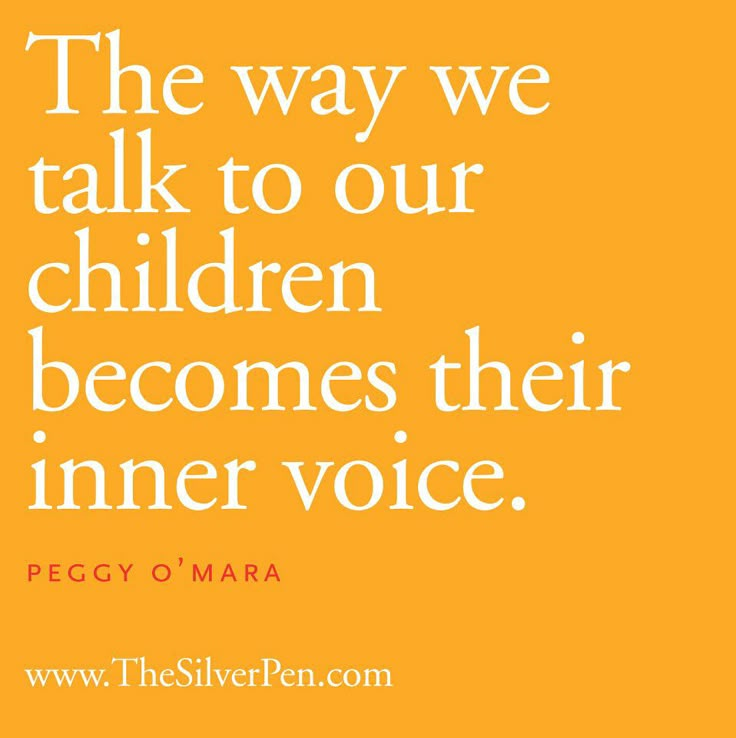 He feels crushed and defeated. And such emotions are often a greater punishment than punitive measures on the part of parents. When a child hears aggressive comments addressed to him, he begins to rebel and prove his own case. Most likely, he will no longer feel shame and will not draw conclusions.
He feels crushed and defeated. And such emotions are often a greater punishment than punitive measures on the part of parents. When a child hears aggressive comments addressed to him, he begins to rebel and prove his own case. Most likely, he will no longer feel shame and will not draw conclusions.
What does this lead to. The child begins to lie and hide the truth from his parents. His goals shift from gaining knowledge to finding tricks so as not to fall under parental depreciation.
Alternative. "Well, I'm upset! You must have tried, what went wrong?”
4. “When you turn 18, then you will decide”
What the child feels. It seems to him that he is not respected, that he will receive the right to be heard only when he comes of age. Well, since they don’t recognize him at home, then there’s no point in talking to these adults.
What does this lead to. The child gets angry, rebels, does everything to spite his parents.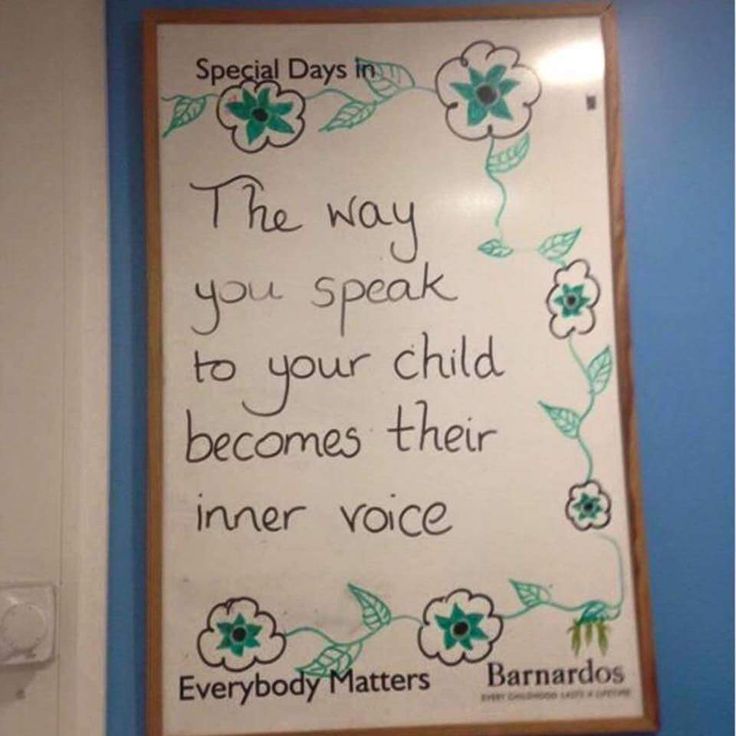 At the age of 18, the ability to decide and take responsibility for one's decisions does not automatically come, and he either remains infantile (sometimes for life) or gets stuck in his rebellion.
At the age of 18, the ability to decide and take responsibility for one's decisions does not automatically come, and he either remains infantile (sometimes for life) or gets stuck in his rebellion.
Alternative. “Make a decision, just let’s see together what it can lead to (further we consider the options for consequences). Are you ready for this turn of events?"
Illustration: Alina.Alina / sutterstock5. “A brother at your age was already earning money…”
What a child feels. He understands that he is valued less than his brother (the son of his mother's friend). And in order to be loved, you need to show results (grades, earnings, sports achievements). The realization that your parents will only love you for your success makes you feel lonely and defenseless.
What does this lead to. A child either blindly and without stopping runs after the result - more money, more prestigious university, more beautiful girl - without experiencing either satisfaction or joy.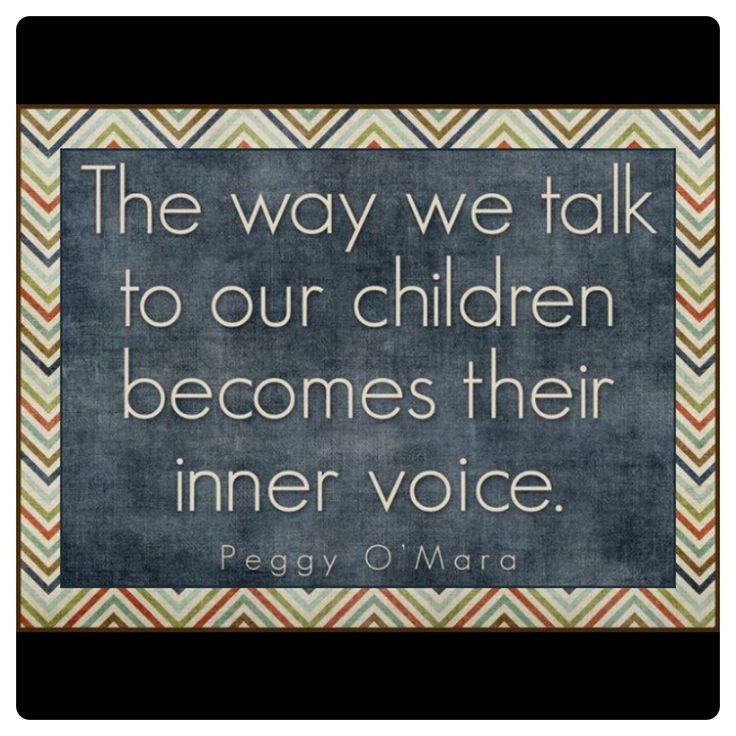 Or he stops trying altogether to justify comparisons that are not in his favor.
Or he stops trying altogether to justify comparisons that are not in his favor.
Alternative. Pointing out a shortcoming, we compare the child only with himself, but not with others. “Last year, at this time, you already entered the regional Olympiad, but this year you haven’t even showed up anywhere ... Is something wrong?”
6. “What will people say now?”
How the child feels. The child feels that for his parents the opinion of others (often complete strangers) is more important than himself. That adults are more concerned with this opinion than with his/her well-being. It's a shame when the opinion of some unfamiliar aunt determines parental love.
What does this lead to. The child tries to be comfortable and good for others, often stepping on the throat of his own song. The opinion of others becomes much more important than their own well-being and ... the well-being of loved ones (spouses, children).
Alternative.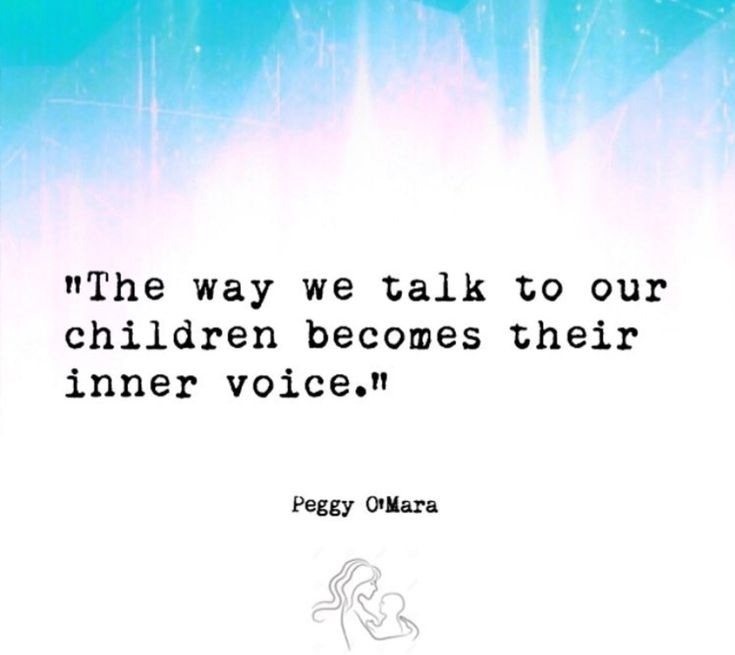 “You certainly have the right to decide for yourself how to act and with whom to be friends. Do you know why such behavior is unlikely to be approved in society?”
“You certainly have the right to decide for yourself how to act and with whom to be friends. Do you know why such behavior is unlikely to be approved in society?”
7. “Do whatever you want, just get away from me!”
How the child feels. He understands that he is not needed. Maybe even prevents mom from being happy. There is a desire to disappear completely, to dissolve, so as not to cause trouble and worries.
What does this lead to. If such reactions are the system in which the child lives, he may have suicidal thoughts. This does not mean that there is a risk of suicide: after all, the path from thought to action is long. But self-harm in this case is quite likely. In the future, there may be an obsessive need to find someone who is genuinely interested in you. The child will be willing to pay a heavy price to be close to someone who does not reject him, and this may lead to a toxic, dependent relationship.
Alternative. “Yes, the situation is complicated.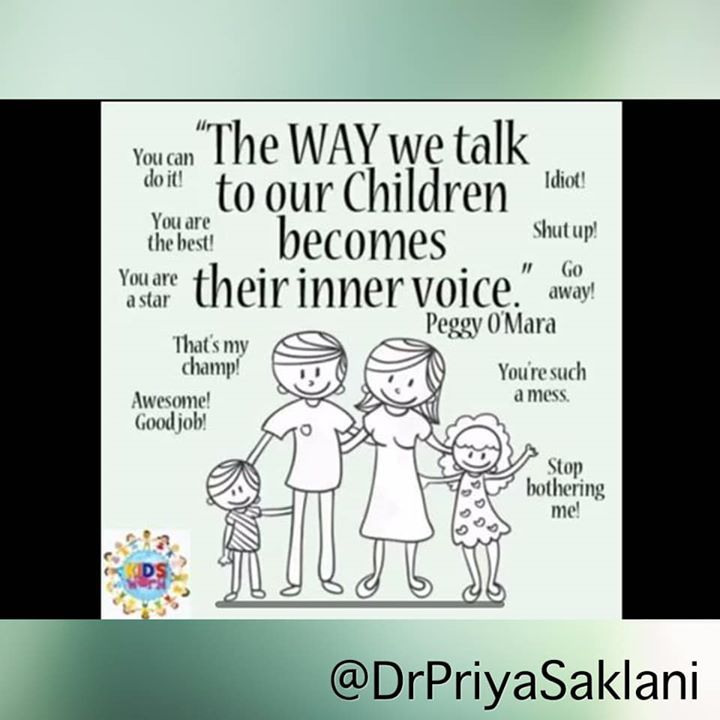 I understand that you are uncomfortable and need help. What can I do to help you make the right decision?"
I understand that you are uncomfortable and need help. What can I do to help you make the right decision?"
8. “Look at you: dressed up like a garden scarecrow!”
How the child feels. He feels that he is neither seen nor understood. Children begin their search for themselves with experiments with appearance, only then they go to the inner plane to answer the question "who am I?". Non-standard outfit, make-up - this is the first experience of going beyond the boundaries of mother's expectations. So any sharp negativity towards an unusual image causes not only resentment, but also the bitterness of rejection.
What does this lead to. Someone does not overcome the threshold of experiments with appearance, all his life proving to the world his uniqueness through extravagance of style. Someone gives up and turns into a "gray mouse" not only externally, but also internally (which is much sadder).
Alternative. “Your clothes are very unusual, they suit you.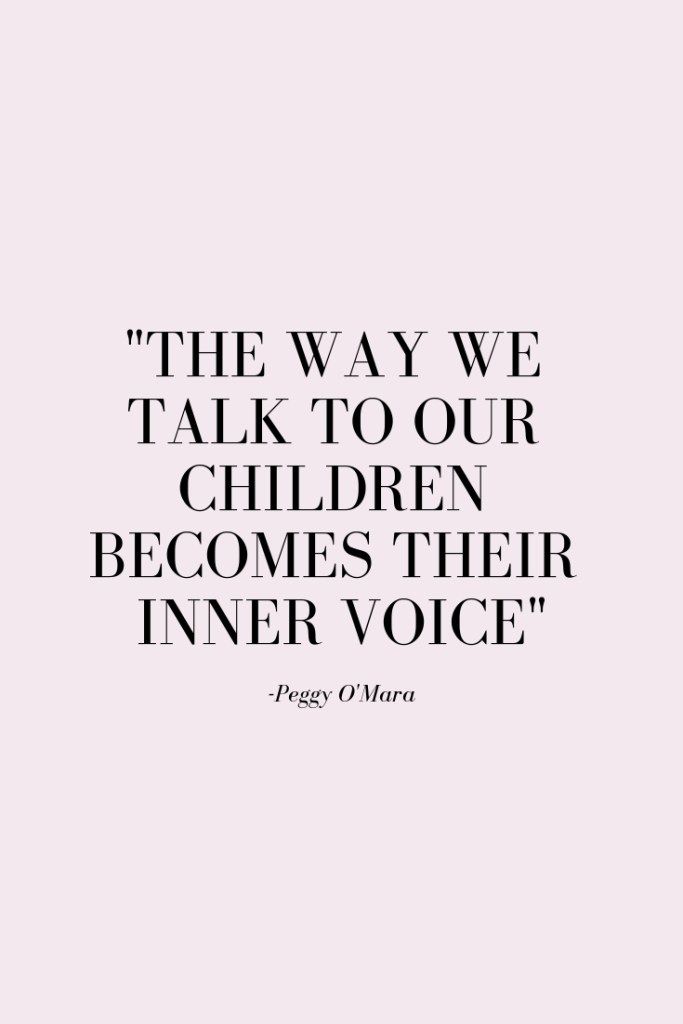 True, I don’t understand her at all, we are from different generations.”
True, I don’t understand her at all, we are from different generations.”
9. “If you become fat (pimply, stupid), nobody will need you”
How the child feels. Such manipulation causes, first of all, fear of the future. For the sake of overcoming such fear, the child, of course, will be ready for a lot. And to go on a diet at 10 years old to save a figure, and to cram hated biology in order to pass for smart.
What does it lead to. Obsession with one's appearance or academic success shifts the focus of normal personality development to external criteria. In other words, instead of looking for himself, his destiny, the child tries to fit himself into the rigid framework of parental ideas about success in the future.
Alternative. “What you are doing (eating a lot of sweets, ignoring studies) can lead to difficulties in the future (you will have to go on a strict diet or work out extra hard). Do you really need it?"
10.
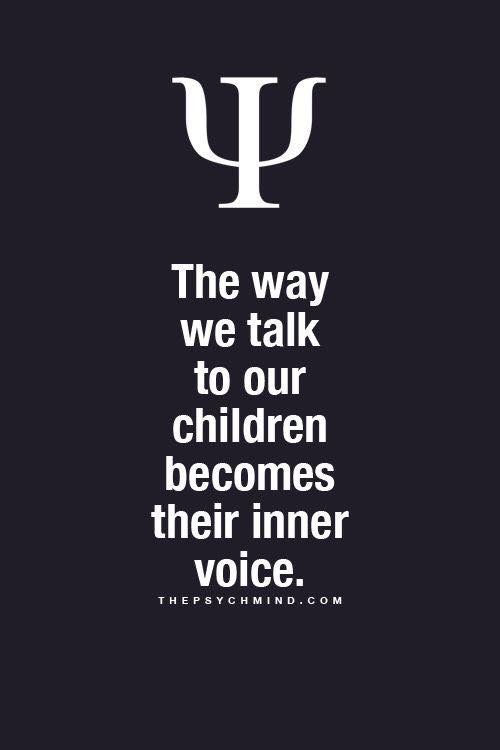 “They laugh at you because you don't know how to communicate. Be faster!”
“They laugh at you because you don't know how to communicate. Be faster!” How the child feels. When there are no friends, but a lot of aggression from peers, it is very painful and scary. But if parents add to this aggression, instead of supporting and sympathizing, it becomes even more painful. The feeling of loneliness overwhelms me. Even at home there is no escape from him.
What does this lead to. In the future, the child (and then the adult) tries to avoid unnecessary contact with others so as not to become a victim of bullying again. Maintaining minimal contact with society, such people prefer solitude and isolation - and this does not always make them happy.
Alternative. “I understand how painful and unpleasant you are. I'm with you. What can we do together to remedy the situation?”
Epilogue
In each of these situations, a wave of indignation rises in us, parents, directed not so much at our child, but at the situation.